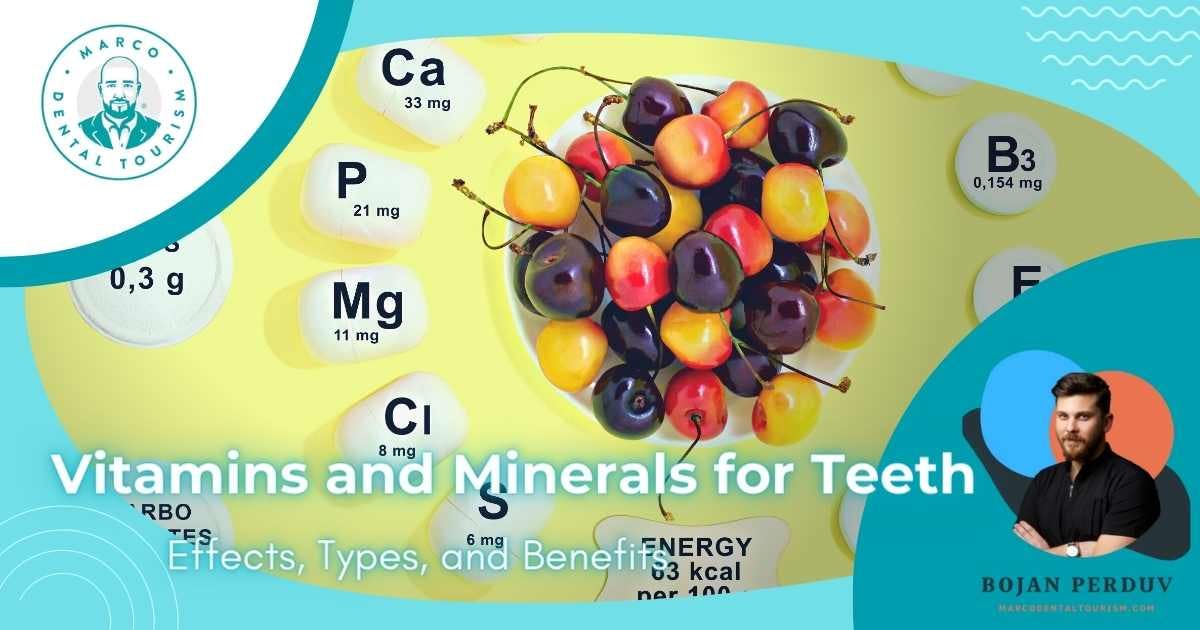How do vitamins and minerals affect teeth?
Vitamins and minerals are one of the most important factors for maintaining dental health. Without a proper diet that contains enough nutrients, teeth can become sensitive and susceptible to tooth decay and other dental problems. That's why this text deals with the topic of how vitamins and minerals affect teeth, as well as information about which foods are an excellent source of these essential nutrients for long-term healthy and strong teeth.

How does diet affect dental health?
A healthy diet rich in vitamins and minerals strengthens teeth and makes them resistant to caries. Conversely, foods high in sugar and starch can be harmful to teeth. Sugars and starches can cause acids that break down tooth enamel and cause cavities.

What foods are good for teeth?
Foods rich in calcium, such as milk and cheese, as well as foods rich in vitamin C, such as citrus fruits and peppers, are good for teeth. Also, foods rich in fiber, such as apples and carrots, help remove bacteria from the mouth, keeping teeth protected and clean.

What is the best food for strengthening teeth?
Foods rich in calcium and phosphorus, such as milk, cheese, yogurt, eggs, fish and nuts, can help strengthen tooth enamel and keep teeth strong. Also, foods that contain vitamin C, such as citrus fruits, tomatoes, and peppers, keep gums healthy.

What vitamins and minerals are necessary for healthy teeth?
A variety of vitamins and minerals are necessary to maintain healthy teeth. Eating foods rich in vitamins and minerals, such as dairy products and leafy vegetables and fruits, can help maintain healthy teeth. Avoiding sweet and sour foods and drinks can also prevent tooth decay and erosion.
What is the role of calcium in dental health?
Calcium is a key mineral for healthy teeth because it is found in the structure of tooth enamel, making the enamel stronger and more resistant. Without sufficient calcium, teeth can become sensitive and brittle. Calcium can be found in dairy products, green vegetables, and other healthy foods.
Why is vitamin D important for dental health?
Vitamin D helps the body absorb calcium, which is the most important mineral for healthy teeth. Without a sufficient amount of vitamin D, the body cannot use all the calcium that is taken in with food. The best source of vitamin D is sunlight, but it can also be found in fish, egg yolk, and many dairy products.
Are there any foods that can damage teeth?
Yes, certain foods can damage teeth and make them more susceptible to tooth decay. Acidic and sugary foods can erode enamel and cause tooth sensitivity. Eating hot or cold foods and drinks can also cause sensitivity and pain.

How does the loss of minerals from teeth lead to damage?
Loss of minerals from teeth can lead to tooth decay because minerals give teeth strength and hardness. A lack of calcium or phosphorus can lead to tooth decay and erosion, which can result in tooth deterioration or, in more severe cases, tooth loss.
How does a lack of vitamins affect dental health?
A lack of vitamin D can lead to a lack of calcium and phosphorus, which can weaken teeth and cause tooth decay. Vitamin C deficiency can cause gingivitis and bleeding gums. Therefore, it is important to ensure adequate intake of vitamins D and C through diet or recommended supplements to maintain overall dental health.
How often should you take dental vitamin supplements?
Dental vitamin supplements do not need to be taken often because a healthy and balanced diet usually provides enough vitamins and minerals needed for dental health. However, if there is a need for supplements, it is important to consult with a dentist about the correct choice, as well as the necessary doses of supplements.

How to choose the right vitamin supplements for teeth?
When taking dental vitamin supplements, it's important to choose ones that contain enough calcium, vitamin D, and other nutrients that are critical to dental health. Before taking supplements, you should always consult a doctor or pharmacist to determine which supplements are best for the specific condition of the patient's teeth.
How to choose the right pills to strengthen teeth?
When choosing teeth-strengthening tablets, consult your dentist and look for products that contain calcium and vitamin D, as these ingredients can help strengthen tooth enamel. Also, it is advisable to avoid tablets containing sugar and acids that cause tooth decay.
What is the connection between vitamin deficiency and oral problems?
A vitamin deficiency can lead to a variety of oral problems, including tooth decay, gum disease, and tooth loss. Deficiencies of calcium and vitamin D can weaken teeth, making them prone to various diseases. A lack of vitamin C can lead to frequent bleeding gums and in the most severe case, tooth loss.
What oral problems can vitamin C deficiency cause?
Vitamin C deficiency can cause a variety of oral problems, including bleeding gums, tooth sensitivity, bad breath, and even tooth loss. Vitamin C plays an important role in maintaining the health of the gums and connective tissue, which is why a lack of this vitamin can lead to the development of gum disease and other dental diseases.

Can calcium deficiency cause tooth deterioration?
Yes, calcium deficiency can cause tooth deterioration and other oral problems. This happens because calcium is a key element in maintaining healthy tooth enamel, and a lack of calcium can lead to tooth fragility and sensitivity. That is why it is important to get enough calcium through food or with the help of prescribed supplements.
Our conclusion
As we mentioned, proper nutrition plays a leading role in maintaining healthy teeth. Nutrients such as calcium, vitamin D, phosphorus, and vitamin C are essential for maintaining healthy dental mucosa and gums. In this text, we have provided useful information and advice on how a diet rich in these ingredients along with regular maintenance of oral hygiene, healthy lifestyle habits, and visits to the dentist can be a permanent guarantee of long-lasting and shiny teeth.














Share your opinion!
What do you think about this topic?
Comments (0)